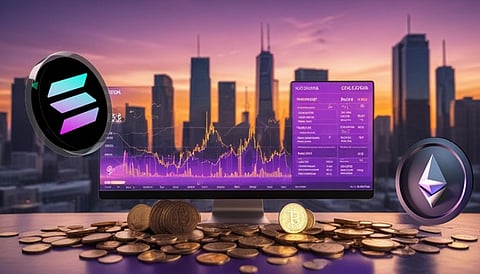

Two notable cryptocurrencies, Ethereum and Solana are acknowledged as powerhouse systems for the blockchain. Though each offers different advantages, which one is the best long-term investment?
Solana is trading at $159.54 with a market capital value of over $74 billion as of October 20, 2024. Technically, Solana is showing positive signals since its rounded bottom pattern suggests a possible price increase. Projected around $260, Solana's next important resistance level might represent a turning point in its next upward trend. The SOL price has been rising steadily; long-term forecasts indicate more expansion. Estimates point to it perhaps reaching $216.36 by 2025. Solana suffers market swings despite its expected price movement, especially in response to seasonal trends. While Solana is expected to soar, short-term market sentiment may cause some volatility, according to the October 2024 projection, which shows Solana hovering between $151.65 and $155.24.
With a market capitalization of $325.89 billion, Ethereum (ETH) is trading at $2,706.94 as of October 20, 2024. The technical chart on the weekly time shows ETH is also creating a rounding bottom, implying a possible bullish reversal. Under the effect of this pattern, Ethereum might challenge its all-time high resistance of $4,864, confirming its next major upward trend in the bull market.
Seasonal changes and historical statistics, however, point to Ethereum possibly slowing down trade activity. If favorable market sentiment rules, analysts estimate ETH may fall as low as $2,558.28, then recover to reach as high as $2,725.58. Notwithstanding the difficulties, Ethereum's supremacy in the DeFi and NFT systems keeps it as a major actor in the long-term expansion of the cryptocurrency market.
Although Ethereum and Solana have great promise in the blockchain space, a new competitor, Rexas Finance (RXS), is rapidly becoming more flexible and powerful, particularly concerning real-world asset (RWA) tokenization.
Rexas Finance distinguishes itself by focusing on tokenizing actual assets, including commodities, gold, and real estate. This method lets regular investors engage in fractional ownership of once unreachable high-value assets. Rexas Finance is closing the gap between traditional finance and the digital asset market by placing actual assets on the blockchain.
which lets people and companies quickly tokenize their assets—is a main highlight. It supports several blockchains, including those fit for the Ethereum Virtual Machine (EVM), therefore offering customers both scalability and adaptability. The Rexas Token Builder streamlines the entire process whether you're tokenizing valuable metals or real estate.
For entrepreneurs trying to raise money for their tokenized assets, the Rexas Launchpad provides another essential tool. It offers a platform where companies and developers can launch their tokens, thus gaining access to a global investment market. This democratizes asset management and fundraising, allowing for a new wave of decentralized finance applications.
Apart from its tokenizing and launchpad tools, Rexas also offers Rexas Estate, a platform designed specifically for real estate investors. Purchasing fractional shares of real estate allows investors exposure to property markets around the world without the traditional constraints of high capital requirements or geographical restrictions.
Rexas Finance sets itself apart from Ethereum and Solana by focusing on practical applications. While NFTs, blockchain innovation, and DeFi are great opportunities for ETH and SOL, RXS is targeting an underserved market: actual assets. This gives it a distinct advantage, particularly for investors seeking real utility beyond mere speculation. Moreover, Rexas Finance is in its fourth presale stage, currently priced at $0.060, with over $4 million raised. The fact that the project is gaining traction without venture capital backing speaks to its decentralized ethos, making it accessible to average investors. Analysts believe that RXS could see 6x returns once it enters major exchanges, with others projecting as much as 10,000% growth by 2025.
Ethereum and Solana provide strong arguments for long-term investors. The second-largest cryptocurrency, Ethereum, offers stability and a well-known ecosystem; Solana is a rising competitor in the DeFi and NFT sectors, although, because of its faster speeds and higher scalability. But Rexas Finance (RXS) offers a special chance: real-world asset tokenization, which might be a big blockchain technological revolution. RXS presents a pleasing substitute for investors looking for significant increases and real value. Long-term, performance-wise, RXS has the potential to outperform Ethereum and Solana with its emphasis on tokenizing real-world assets, creative features like the Token Builder, and rapidly expanding presale. Rexas Finance could be the best alternative for those wishing to participate in the next bull run with the possibility for outstanding returns in the future, but investors still have to give their options great thought.
About Rexas Finance :-
Website: https://rexas.com
Join our WhatsApp Channel to get the latest news, exclusives and videos on WhatsApp
_____________
Disclaimer: Analytics Insight does not provide financial advice or guidance. Also note that the cryptocurrencies mentioned/listed on the website could potentially be scams, i.e. designed to induce you to invest financial resources that may be lost forever and not be recoverable once investments are made. You are responsible for conducting your own research (DYOR) before making any investments. Read more here.
